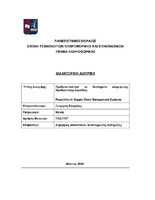Προδραστικότητα σε συστήματα διαχείρισης εφοδιαστικής αλυσίδας
Proactivity in supply chain management systems

Προβολή/
Λέξεις κλειδιά
Proactive computing ; Event driven computing ; SCEM ; Situation awarenessΠερίληψη
Η προδραστική πληροφορική (proactive computing) αναφέρεται στην ικανότητα των υπολογιστικών συστημάτων να προλαμβάνουν λειτουργικές ανάγκες του περιβάλλοντος τους πριν αυτές εκδηλωθούν. Η ικανότητα προληπτικής λειτουργίας βασίζεται σε δυνατότητες που έχουν τα προδραστικά συστήματα να αντιλαμβάνονται και να κατανοούν γεγονότα που συμβαίνουν στο περιβάλλον λειτουργίας τους, προβαίνοντας στην κατάλληλη διαχείριση. Η προδραστική πληροφορική βρίσκει εφαρμογή σε έντονα δυναμικές περιοχές όπως αυτή της εφοδιαστικής αλυσίδας.
Το περιβάλλον της εφοδιαστικής αλυσίδας χαρακτηρίζεται από δυναμικές αλλαγές. Οι αλλαγές αυτές οφείλονται σε ένα πλήθος παραμέτρων όπως εξωτερικούς είτε εσωτερικούς παράγοντες. Οι παράγοντες αυτοί δημιουργούν γεγονότα που επιδρούν στη λειτουργία της εφοδιαστικής αλυσίδας και είτε δημιουργούν ευκαιρίες προς εκμετάλλευση είτε δημιουργούν αποκλίσεις από προκαθορισμένα επίπεδα λειτουργίας. Η διαχείριση γεγονότων που δημιουργούν αποκλίσεις από προκαθορισμένα επίπεδα λειτουργίας είναι ο χώρος όπου το Supply Chain Event Management εφαρμόζεται.
Το SCEM είναι μια προσέγγιση διαχείρισης της εφοδιαστικής αλυσίδας μέσω του εντοπισμού, ανάλυσης και επεξεργασίας γεγονότων με σκοπό τη βελτιστοποίηση του συνόλου της εφοδιαστικής αλυσίδας. Ο συνδυασμός προδραστικής πληροφορικής και SCEM είναι ο ερευνητικός τομέας στο οποίο εντάσσεται αυτή η μελέτη. Η επαύξηση των δυνατοτήτων του SCEM με χρήση της προδραστικής πληροφορικής στοχεύει στη δημιουργία ενός προδραστικού πλαισίου όπου είτε τα ίδια τα γεγονότα είτε οι αρνητικές επιδράσεις αυτών θα προλαμβάνονται πριν επηρεάσουν την απόδοση της εφοδιαστικής αλυσίδας.
Στην παρούσα διπλωματική διατριβή εξετάζεται η προδραστικότητα στην εφοδιαστική αλυσίδα και διερευνώνται τρόποι ώστε να επιτευχθεί αυτή. Ειδικότερα εξετάζονται το περιβάλλον της εφοδιαστικής αλυσίδας, οι συμμετέχοντες σε αυτή καθώς και τα γεγονότα (events) τα οποία επηρεάζουν αρνητικά την απόδοση της εφοδιαστικής αλυσίδας και προτείνονται τρόποι ώστε να αποφευχθούν οι αρνητικές επιδράσεις των αποκλίσεων.


